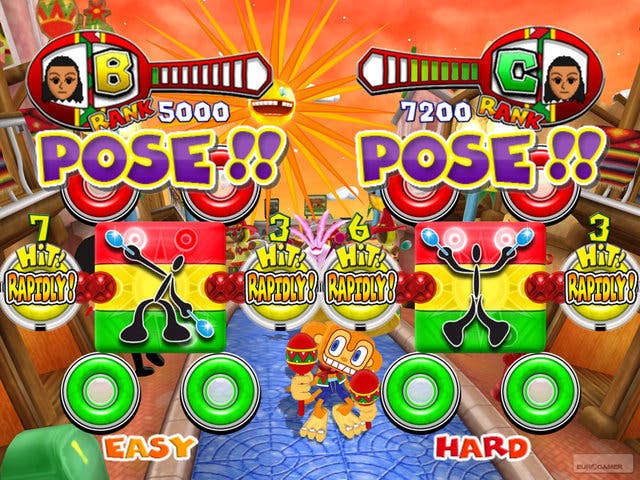Samba De Amigo
Maracaulous.
Re-issuing dusty old back-catalogue titles on the Wii isn't perhaps the most imaginative or exciting thing SEGA could have done. Some new games would have been nice. But with a completely overlooked ace up their sleeve like Samba De Amigo, you can't blame them at all. Fondly remembered for being one of the more outlandish rhythm-action games of the early part of the decade, its GBP 99.99 price point and ridiculously limited release on Dreamcast meant that Sonic Team's effort became little more than a collectible curio. If you're one of the 2000 UK gamers who bagged one, lucky you. The superb maraca controllers remain, to this day, the most joyfully silly gaming peripheral ever made.
The premise is utterly daft, and the game is all the more endearing for it. You play an unhinged-looking, square-headed, sombrero-wearing, maraca-shaking monkey. You can tell he's happy. He's undoubtedly had his fill of bananas, and now wants to express his undying love for latin rhythms by shaking a set of maracas in time to the joyous music. Don't we all.
The gameplay couldn't be much simpler, and nothing fundamental has been changed from the DC original (including the visuals; these remain as striking as they ever were, with the addition of Miis). In what amounts to a slight variation on the Dancing Stage gameplay, you have to shake the maracas (in this instance the Wii remote and nunchuk) in the appropriate direction at the right time. An amusing, brightly coloured animated scene plays out in the background and the screen is overlaid with six markers, telling you whether to shake up, down or in the middle as the blue dots hit them. As you might expect from a rhythm game, the objective is to get the timing right and build up your score multiplier, ending each song with the highest possible score and grade.
Occasionally during all this maraca shaking madness, you have to "pose" or "hustle" in the manner depicted. Posing involves holding the maracas still in the direction of the highlighted circle, while hustling is a little more involved and tasks you with rapidly waving one or both of your maracas between the illustrated positions. In short, you'll look like an absolute banana while you're doing all of this, but that's obviously the point. While suitably inebriated, this could be the stuff of legend.

As with the Dreamcast original and its Japanese-only Ver.2000 upgrade, there are quite a few modes eked out of such a straightforward game mechanic. The main career mode serves as a means of unlocking the 40-odd songs and numerous throwaway unlockables (like maraca sounds). Within each of the four difficulty levels are roughly five stages, each with a number of songs to run through. It's not the most inspiring way to experience the game, but becomes a necessary evil if you want to be access particular songs that otherwise remain off-limits in the regulation single or multiplayer modes. Easy and Normal difficulty prove to be an absolute doddle, with A grades routinely dished out to those with even the vaguest sense of timing.
Beyond that, the limitations of the Wii remote's motion-sensing capabilities become apparent at the exact point you really need them to be reliable. Try as Gearbox might, the bald truth is that the Wiimote is far from an exact instrument in precisely judging where you're shaking. Time and again, just as you're building up a great multiplier, a simple repetitive moment can be misinterpreted, leaving you staring balefully at your hands, wondering why that shake was deemed incorrect when all the others were fine. At lower skill levels, you can afford the odd hardware-related slip-up; you'll make it through anyway. But, really, the routines are basic enough that you shouldn't be making any mistakes.








